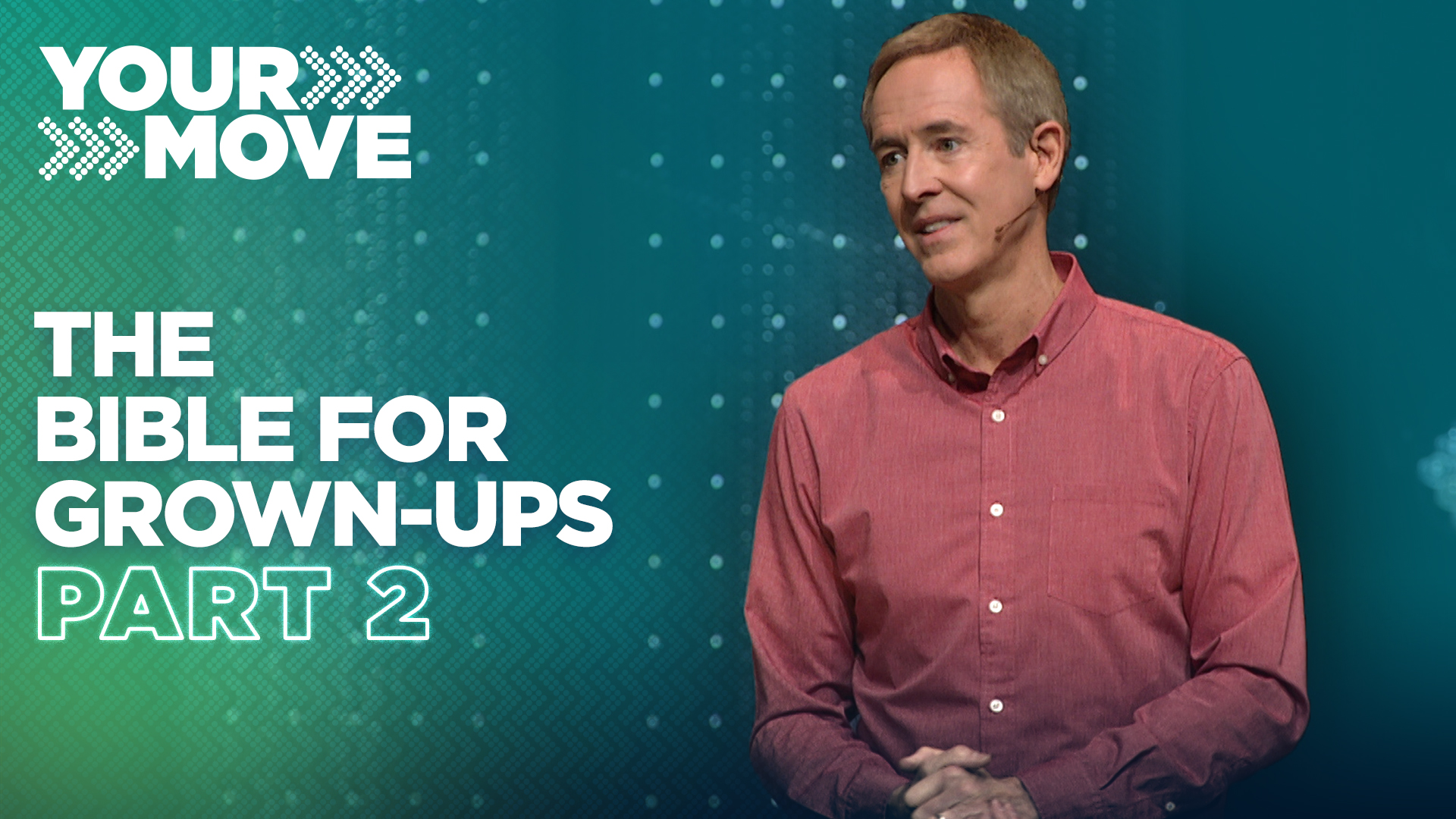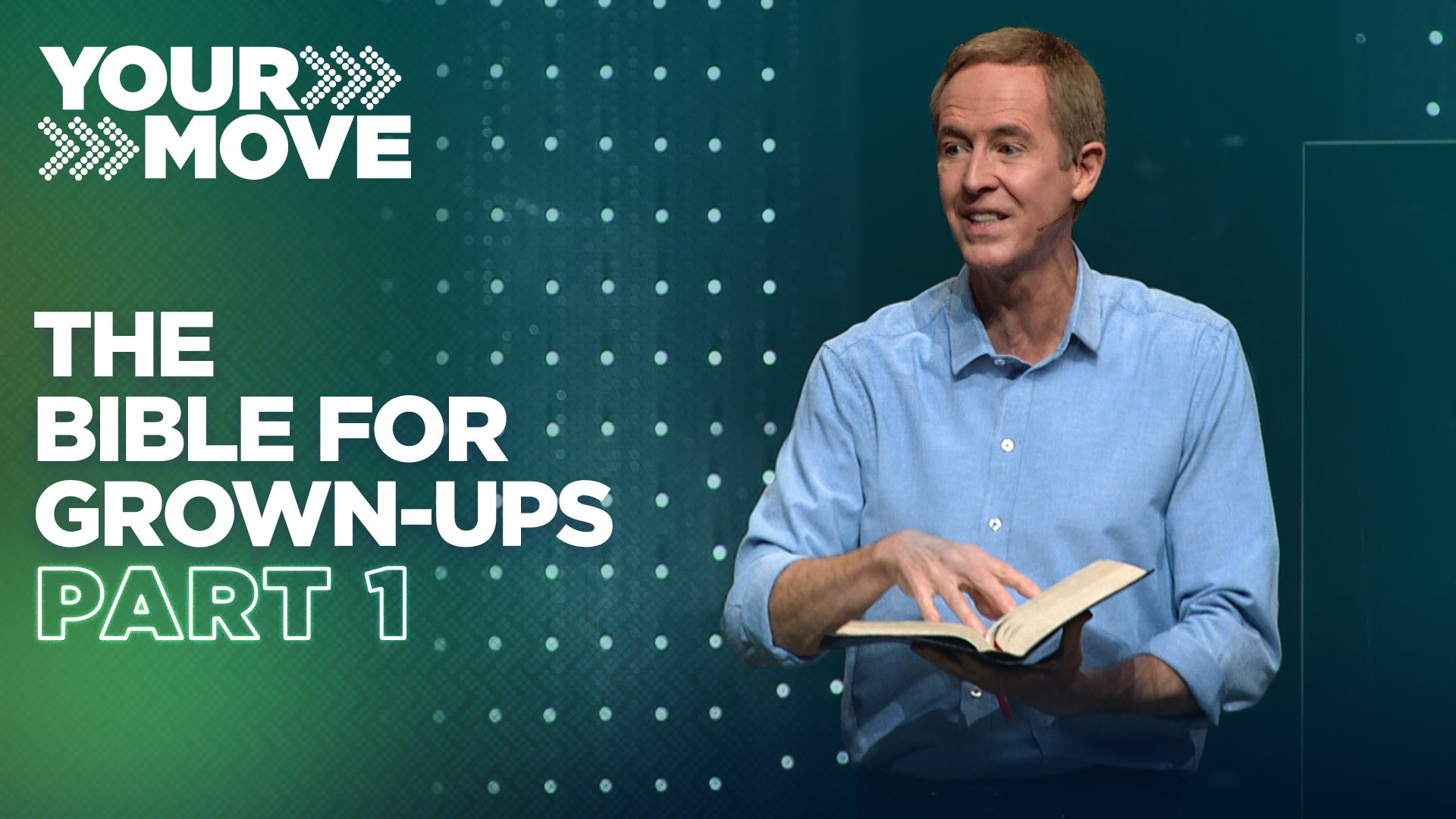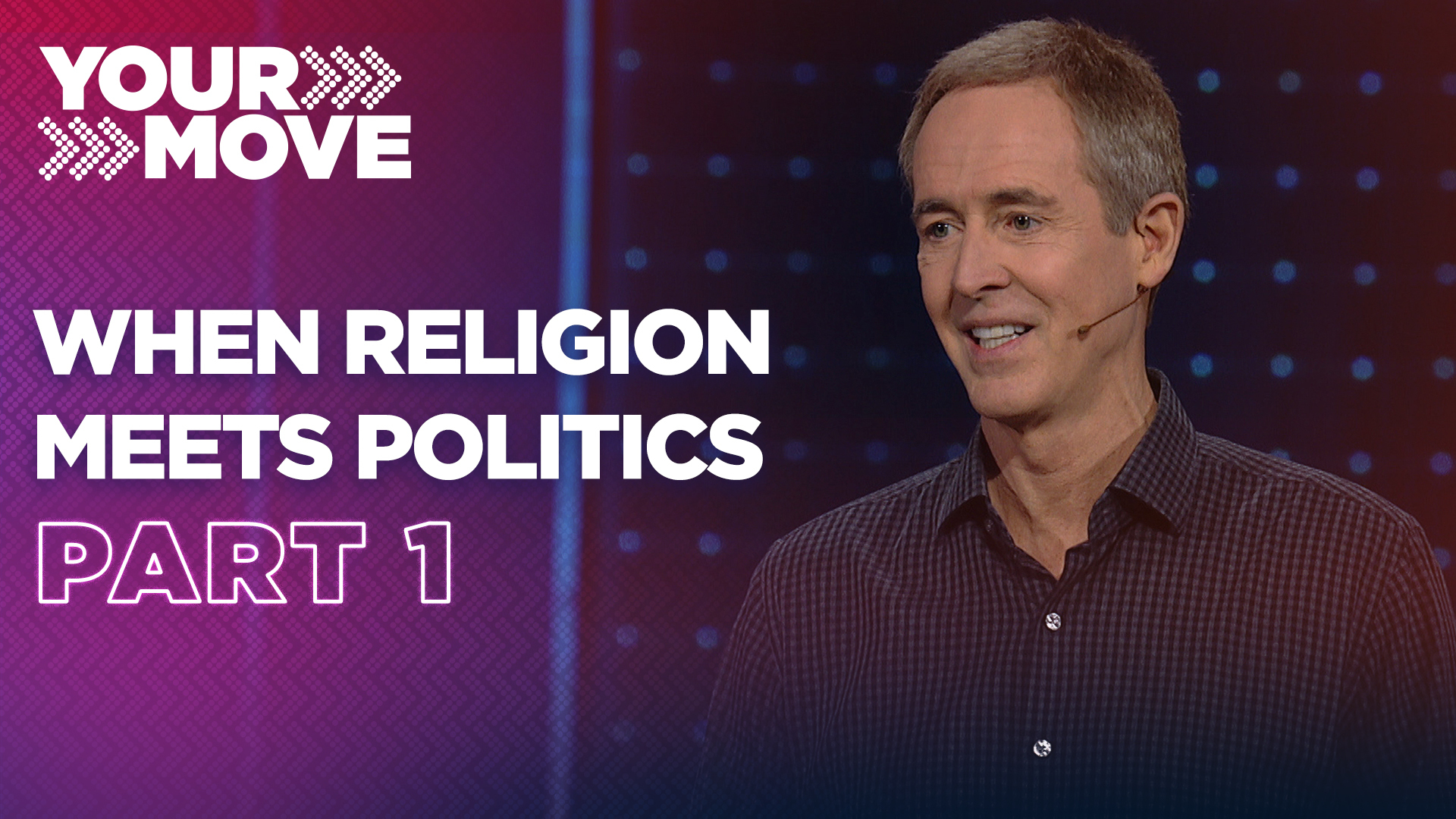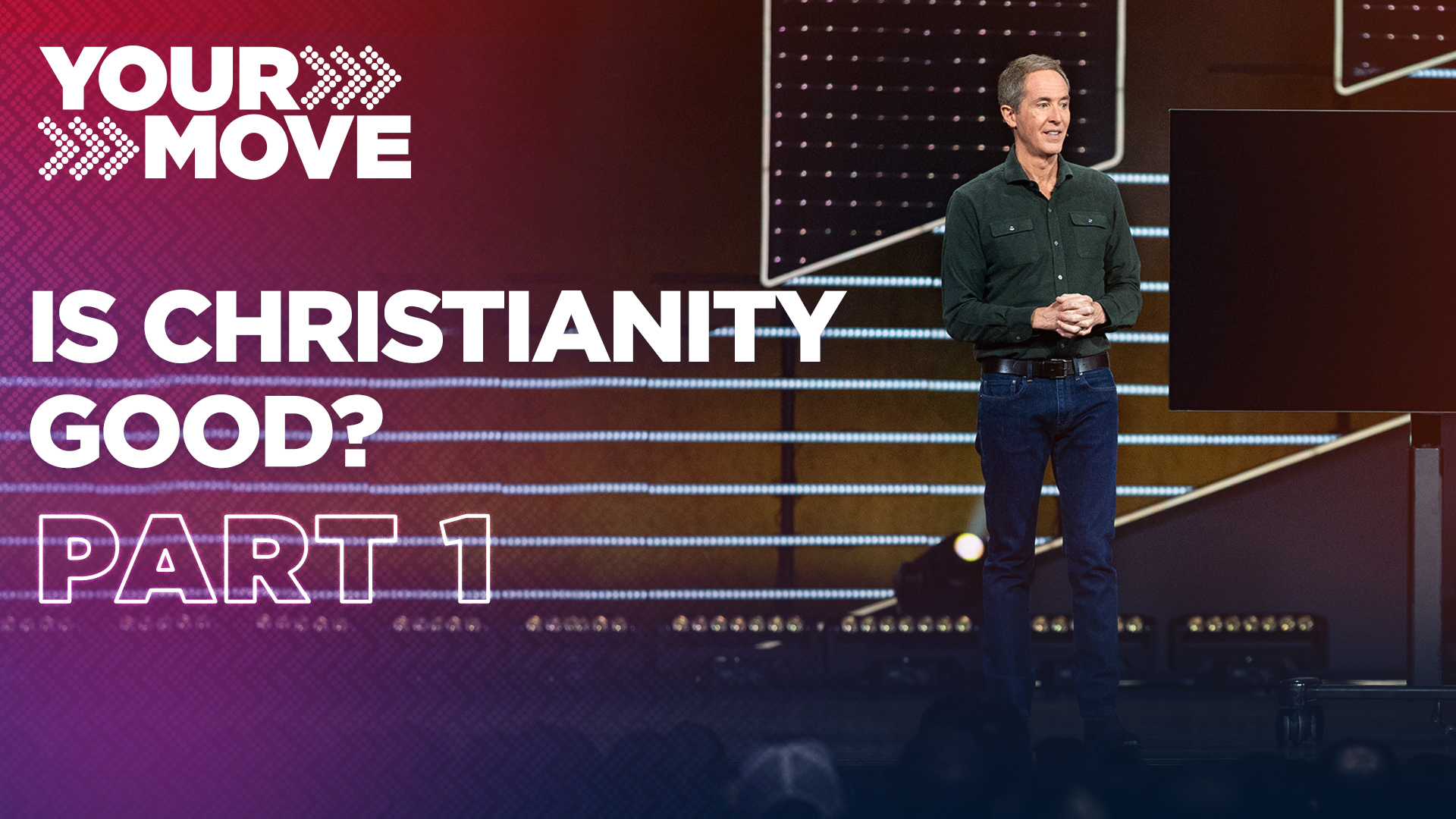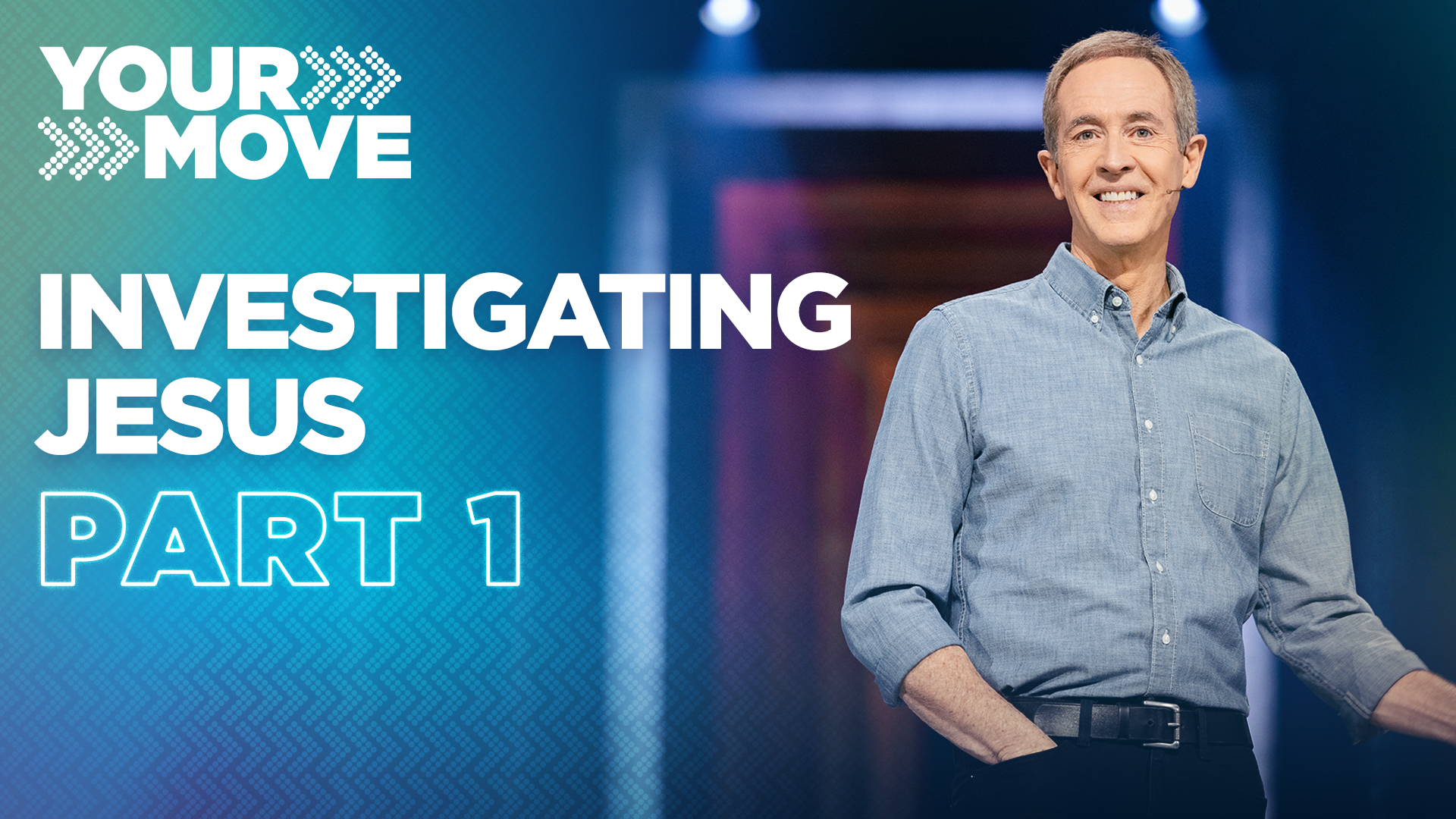The story of how the world got the Bible begins with a single event—an event so extraordinary it was worth writing about.
- How were you first introduced to the Bible?
- Has your view of the Bible changed as you’ve gotten older? If so, how?
- If you had the chance to read the personal journal of someone whose life has influenced yours, who would you choose? Why would their stories and ideas be meaningful to you?
- When it comes to faith, the Bible, or God, have you found yourself saying, “I just don’t believe it anymore”? What is the “it” you no longer believe?
- If John’s account of the life of Jesus was all you had, would it change the way you view the Bible? Would it change what you believe about faith?
NOTE: The following content is a raw transcript and has not been edited for grammar, punctuation, or word usage.
So, this is a series for adults who were introduced to the Bible as children. And this is a series for adults who were introduced to the Bible as adults by adults who were introduced to the Bible as children. Because either way you go, most of us know some Bible stories, but very few of us know the story of the Bible. That is, how we got the Bible to begin with. Understanding how we got the Bible is almost as important as knowing what’s in the Bible, because, as we’re gonna see, the backstory sheds enormous light on the story.
Now, was it important to us as children growing up that we knew how the Bible came to be? Probably not. We would have been bored stiff, and we weren’t interested at all. So, it wasn’t a big deal. But as adults, this is an extraordinarily important topic. And it’s a fabulous story, because if you don’t know the story of the Bible, it’s easy to discount the stories in the Bible. In fact, some of you have walked away from faith, or you have friends or a family member or kids who’ve walked away from faith.
And it’s understandable. Because if you don’t know the story of the Bible, it’s very difficult to continue to embrace the stories in the Bible. The big problem is––we’ll talk about this for the next few weeks––is that the way that we got our Bibles is not the way the world got the Bible. By the time you got your Bible, it had been chaptered and versed up, right? It had been footnoted. It was in English. All the type was set. There were maps. There were titles. There were headers. And there were cross-references; there was a concordance. When you got your Bible, it was all done, but that’s not how the world got the Bible. And the story of how the world got the Bible sheds extraordinary light and gives us insight into the stories in the Bible.
Now, my first Bible didn’t look like this. My first Bible was red. It was much smaller. It was wrapped in genuine imitation leather, and it had my name printed on the front in gold leaf. We were told, “This is God’s Word. It’s all true. Try to live your life by it.” I don’t know what kind of words you were told, depending on how old you were.
And, of course, we believed what we were told because these were adults telling us, and we believed whatever adults told us. The truth is, for most of us, we developed an understanding of and a respect for the Bible not based on reading it, because very few people actually read it. We based our understanding on what we were told about the Bible and the stories that were selectively told to us as children, as high school students, and, ultimately, as adults. So, regardless of where we’re coming from, what happens is that all of us carry our childhood perspective of the Bible into adulthood.
Now, for many of us, if the Bible says it, that still settles it. But for many of you, those many of you maybe who weren’t even raised with the Bible, it’s just not that simple anymore, because somewhere along the way somebody pointed out to you what else the Bible says: the parts they didn’t talk about in Sunday School, the parts they didn’t talk about at church. In fact, you may be in a situation where you brought some of those parts to your parents’ attention––or to your pastor or priest’s attention––the parts they skipped over in Sunday school or in church. And you find yourself having a very difficult time reconciling what you found in the Bible with the reality that you live in and the world that you live in. And you’re an honest person. You couldn’t just look the other way. So perhaps, because of what you discovered about or in the Bible, you walked away.
Now, you may be surprised to learn that the story of the Bible does not begin in the beginning. The story of the Bible actually begins toward the end of the middle. The story of how we actually got the Bible begins with a first-century doctor who was not Jewish, but Greek, and his name is Luke. And Luke actually spent the time necessary to document the events of the life of Jesus. And the reason he sat down to document the events of the life of Jesus is that he had a wealthy friend named Theophilus. And Theophilus was a first-century Jesus follower, first-century Christian. Theophilus, like many people in this region of the world, had heard enough stories about Jesus and had met enough of the eyewitnesses of Jesus’ life and miracles that he had put his faith in Jesus. But Theophilus wanted an orderly account of how this whole thing transpired.
So Luke decided––for the sake of this wealthy friend Theophilus––to sit down and write an orderly account of the events of the life of Jesus. And here’s how his document begins. He says: “Many have undertaken to draw up an account or a document of the things that have been fulfilled or the things that happened among us.” Something had happened worth documenting, and the interesting thing is that Luke says, “I’m not the only one trying to document all this. I’m not the only one who’s trying to put down the story of the events that actually happened here in this region of the world.”
He goes on. He says this: “With this in mind, since I myself have carefully investigated everything from the beginning by going back to the beginning of Jesus’ life, along with a lot of other people, I, too, decided to write an orderly account for you, most excellent Theophilus.”
And so, Luke says, “I’m gonna spend the time necessary to put together an orderly account.” Now, this is really, really important, what I’m gonna say next. When Luke was writing this document, Luke was not writing the Bible. Luke had no idea that this would ever exist. Luke is simply creating an orderly account of the events of Jesus’ life based on eyewitnesses and based on the people that he interviewed. And Luke––because of the way he did this––tells us why and how the story of the Bible began.
And the story of the Bible began. And the reason we even have a Bible is because when it became clear to the people who followed Jesus in the first century, when it became clear to them that Jesus was clearly not who he claimed to be, that’s when the story of the Bible actually began. Because Jesus claimed too many things about himself. I mean, he said some wonderful things, he did some wondrous things, but Jesus said too much about himself. And when Jesus was crucified––and there is other extra-biblical literature that tells us that Jesus was a historical person and that Jesus was actually crucified or put to death under the Roman Empire, so nobody disputes that. But in the first century, when Jesus’ followers recognized that Jesus had been put to death by Rome, it was game over; there was gonna be no story.
So Luke is documenting something fabulous that happened in the first century, and his story tells us that a man named Joseph of Arimathea, a part of the Jewish supreme court, and a man named Nicodemus––two people that everybody in that region would have known; these were famous guys in the first century within Judaism––that these two men went to the cross and took Jesus’ body down. Not because they believed he was the Savior of the world, not because they believed they would ever get their names in a book, but because they had so much respect for him. But they were so disappointed because, clearly, Jesus was not who Jesus claimed to be.
In fact, Luke says, “I thoroughly investigated it, and here’s what happened. ‘After he was crucified, Joseph of Arimathea and his servants took the body down and wrapped it in a linen cloth and placed it in a tomb cut into rock, one in which no one had ever been laid.’” Luke gives us all this detail. He goes on, and he says this, “The women who had come with Jesus from Galilee followed Joseph of Arimathea and saw the tomb and how his body was laid in it.” And then these women went home, and they prepared spices and perfumes. Why? They were gonna come back and re-embalm the body. Why would they come and re-embalm the body? Because Jesus was dead, and everybody expected Jesus to stay dead.
And in this moment––this is so important––in this moment, there are no Christians. There are no Jesus followers. There is no church. There is no hope. There are just brokenhearted women and disillusioned disciples who are scared for their own lives. And if it had ended there, there would be no “The Bible,” there would be no Christians, there would be no church, and there would be no––as we’re gonna see––Old Testament. And there would be no account by Luke considering and looking into the details of the life of Jesus. This is so important.
Luke documented the life of Jesus because the story of Jesus didn’t end on a Roman cross. If the story had ended there, there would be no story. Luke tells us the reason that he was a Jesus follower, the reason that Theophilus was a Jesus follower in the first century: and it is because Jesus was seen alive. And once he came back to life, his followers came out of hiding and they went to Jerusalem. And they went into the streets of Jerusalem and faced down the very people that had Jesus crucified, and they got arrested. And they had to face down the very men who were responsible for taking Jesus to Pilate to be crucified in the first place. And Luke documents these early sermons. Luke documents what these men said in the face of extraordinary circumstances, in the face of actually being arrested and put to death just like Jesus was. In fact, here’s just one sentence from one sermon that Luke documents. Because again, he’s trying to document everything that happened surrounding the life of Jesus and beyond.
Peter, one of Jesus’ followers, says to Caiaphas, the high priest, “God has raised this Jesus to life, and we are witnesses of it.” We didn’t read about it. We didn’t hear about it. We saw him. And so the Jesus movement, the church, was birthed. But still, there’s no Bible. Luke goes on to document what happens for the next about thirty years following the resurrection. He documents it in a book in our New Testaments called Acts, or Acts of the Apostles.
Luke knew Peter. He interacts with Peter. There are conversations between Luke and Peter that are documented. Luke knew John. There are conversations between Luke, John, and James, the brother of Jesus. These men knew each other. Luke traveled with the apostle Paul all around the Mediterranean Basin planting churches, and he documents the rise of the Gentile church. But here’s the cool thing, and here’s the interesting thing, and here’s the thing that you need to know. Luke admits right up front, “Hey, I’m not the only one. I’m not the only one trying to document what happened in our midst.” Remember what he said? “Many have undertaken to draw up an account of the things that had been fulfilled or the things that happened among us.”
And the question that we all should wrestle to the ground is this. And if you’ve walked away from faith or walked away from Christianity, I understand it. If I heard your story as to why you walked away, I would probably say, “Who could blame you?” But here’s something you need to wrestle with, because I think you should come back. The question is: Why so many? Why so many? Why so many? That wouldn’t be unusual now for multiple people to cover the same event in detail, but back then it was expensive to write. Most people were illiterate anyway. Why would Luke and why would others feel compelled to document the events that happened in the first century surrounding the city of Jerusalem? And the answer is undeniable, because something extraordinary happened. Not something extraordinary was written––that would come later. Something extraordinary happened, something that had to be preserved.
In fact, Peter––the apostle Peter––dictated his account to a young man, a young Greek named John Mark. We know this from a second-century writer named Papias, who tells us that the Gospel of Mark came from the lips of Peter. And Peter was probably illiterate: an illiterate––but smart––fisherman. So consequently, he sat down with another Greek, and he gave him his story. And the Gospel of Mark––but let’s not think “Gospel” yet––the document that we call “Mark” is short. It’s action, action, action. This is how the fisherman’s account would sound. It’s bottom line. It’s event-driven.
And again, John Mark is no mystery to the history. John Mark traveled with the apostle Paul. John Mark knew Luke. He was a friend of Luke. And this document was written in the fifties, just about twenty years after the resurrection. Luke said several people sat down to document this extraordinary event. Matthew was one of them. We call it the Gospel of Matthew, but before it was called a Gospel, it was simply a document. A document addressing first-century Jews to say, “Trust me. Jesus is the one we’ve been waiting for. Jesus is the Messiah.” And he leverages Old Testament passage after Old Testament passage after Old Testament prophecy, saying, “Look. All of the prophets, all the Law and the prophets pointed to the coming of the Messiah, and Jesus fulfilled so many of those prophecies. Believe that he is who he claimed to be.”
The church fathers––that’s what we call the group of people that came after the disciples in late first and second century––church fathers indicate that there was actually a Hebrew copy, a Hebrew version. They indicate that the original version of Matthew was probably written in Hebrew, which makes sense; it was written to the Jews. But then it was translated into Greek, and the version that we have today is a Greek version. Why would a Hebrew document be translated into Greek? Because Greek was the language of the Eastern Empire. This was not simply a message for Jewish people. This was not simply a message for people in that region of the world. This was a message for the whole world.
So, there’s Luke, there’s Mark, there’s Matthew, and then there’s the Gospel of John. John decided that he, too, needed to get out of him the story and the experiences he had with Jesus. And in his document that we call the Gospel of John, he tells us at the end of his account why he bothered to write in the first place, knowing that other people had written as well. And here’s what he said––and I don’t want you to miss this––John writes: “Jesus performed many other signs . . .” Because John’s just given us a list of things that Jesus has done, so we’re at the very end of the Gospel. He says, “Oh yeah, we’re getting to the end of this thing, but I want you to know this isn’t the whole story. ‘Jesus performed many other signs in the presence of his disciples.’”
These weren’t done in secret. And by disciples, he’s not talking about the Twelve. He’s talking about the hundreds of people that follow Jesus from the banks of the Jordan River right through to the crucifixion, and then showed up after the resurrection. He said, “There were many other things Jesus did that are not recorded in this book.” And here’s something very important for you to know. When John says that there are events that Jesus accomplished and things that Jesus did that don’t show up in “this book,” “this book” is not a reference to the Bible.
“This book” is a reference to the document he’s writing. He says, “There are many other things that Jesus did that don’t show up in my account of the life of Jesus.” And then he says something so important. “But these, the ones I have chosen, these are written . . .” In other words, “As I face the end of my days, as I face the end of my life, my faith is still intact, not based on what I see around me now, but based on someone I met and what I saw.” And so John says, “I wanna speak to future generations. I want future generations to know what I saw, what my hands have handled, what we experienced.”
Here’s what he says: “But these things are written that you . . .” And do you know who “you” is? “You” is you, and “you” is me, and “you” is all of us. In other words, John is saying this: “The reason I’ve written this account of the life of Jesus is so that whoever stumbles across this document . . .” Imagine this; he’s not thinking the Bible. He’s thinking, “I just want the future generations to know what I saw, what I experienced, what changed my life, what changed my worldview, and what gives me hope when the world around me seems to be absolutely hopeless.” This document was dictated by an eyewitness of these extraordinary events, and Luke felt like he had to tell about Peter, Matthew, and others.
So, here’s what he says: “But these are written that you may believe.” Now again, back to us. It’s possible that you left faith because . . . well, you have lots of presenting reasons. Something you read, something you heard, or you’re just not interested. And the question that I hope you’ll wrestle to the ground and the one that John wants you to wrestle to the ground––because he wants to wrestle it to the ground with you––is this: “What is the ‘it’ that you don’t believe?” If you walked away from faith, or considered it, or are considering it, what is the “it”?
And John is about to tell you the only “it” that really matters. This is so important. John, an eyewitness, someone who spent time with Jesus, says this: “These things that I’ve written in this gospel, these things are written that you may believe.” Believe what? “. . . that Jesus is”—in fact—”the Messiah”—to the Jews and the Son of God to the Greeks and the Romans—”and that by believing, you may have life in his name.” Regardless of what you’ve heard, regardless of what you’ve seen, regardless of what you’ve experienced in your life as a Christian, John says this is the “it.” That’s it, and that’s the only “it” that really matters. And the implications of this statement in this document we call the Gospel of John are staggering. And here’s why I say that. If John’s account of the life of Jesus is all you have, John’s account is all you need.
If John’s account is all you have, John’s account is all you need. He said, “I have written this in such a way that if this is the only message you stumble across, if this is the only document you ever read, if this is the only bundle of stories you are ever aware of, it’s enough for you to have confidence that God has done something in the world, that God has done something in the world on your behalf.” Because it’s John that interrupts Jesus’ conversation with Nicodemus, because he can’t help himself. And John says, “Look, let me summarize it. ‘For God so loved the whole world’––the Jewish world, the Greek world, the Roman world, the pagan world, the barbarian world––that God loved the whole world so much that he sent his Son. And I have been eyeball to eyeball with the Son of God––who I’m convinced is God in a body. ‘That whoever believes’––whoever places their trust in him and who he claims to be––‘will not perish’—will not be lost to God, but will begin to experience in this life a different kind of life.” John calls it eternal life. John says, “If this is all you ever hear, this is all you ever need.” Whew. Isn’t that amazing? Two hundred and seventy years before this book is ever assembled.
That brings us up to the end of the first century. At the end of the first century, there’s still no “The Bible.” At the end of the first century, there are thousands and thousands of Christians—Jewish Christians, Greek Christians, Roman Christians, and Christians in other parts of the world. At the end of the first century, there are thousands of Christians. And there are dozens, and then hundreds, and then eventually thousands of copies of these documents floating around, telling about the life and the works of Jesus. And they’re meticulously copied, and they’re bundled together. Some people have a gospel, and some people have two gospels. Some people have three, and some people have a part of one and part of another.
And can you imagine? Can you imagine if you were a first-century Jesus follower? Or a second-century Jesus follower? Can you imagine how valuable these documents would be to you? That perhaps you had only heard the stories of Jesus. Then somebody comes to your town or your village, or your grandfather shows up, and says, “Let me show you something.” And he uncovers, “Here is a full copy of John’s recollections of his life with Jesus.” Can you imagine this?
I’ll give you an illustration that––I’ll admit up front––falls way short of the magnitude of what was happening in the first or second century. I grew up hearing stories of George Washington Stanley. Yes, that’s his real name. This is my father’s grandfather. And it looks like he’s preaching during the apocalypse. Like, there’s nothing left. Only the machines roam the earth, and he’s the last surviving human being. I don’t know where this picture was taken. He had lived, and he did most of his ministry in North Carolina. But my dad’s grandfather, George Washington Stanley, was a preacher. He started a whole bunch of churches, and he traveled around. And when my dad was a teenager, just as he was finishing high school and about to start college, my dad went and spent a good bit of time with his grandfather.
My dad’s dad died when he was seventeen months old, so he never knew his father. And so, George Washington Stanley, for a short period of my dad’s life, was his guide. This is a big part of the reason my dad went into ministry and became a pastor. And I grew up as a kid hearing these amazing stories that my dad’s grandfather told my father, that my father told me. And if I had time, I could tell you some of the stories. And maybe they were embellished a little––I don’t know––but they are fascinating. As a child, you just leaned forward and said, “Dad, just tell us that one again.” Because he preached during some very difficult times in the Southeast.
So, I grew up on these stories. And then, about five years ago, my dad calls me. He said, “Andy, I want you to come over. I wanna give you something.” So, I drove over to my dad’s house. We go into the kitchen, and there on the kitchen counter are these two little blue books. He said, “Guess what these are?” I said, “What?” He said, “I didn’t know this until last week, but my grandfather actually wrote a book.” He said, “My sister was cleaning out some things, and she ran across these two. And these are the only two copies she had. She knew that I would want one, and she knew that I’d probably wanna give you one.” And he hands me a copy of a book written by his grandfather, my great-grandfather, the man that was so instrumental in influencing my dad, who influenced me as it relates to the ministry. And so I went home, and I read every single word. How valuable is that book to me? How valuable is that book to my father? We can’t even begin to imagine.
Again, more than two hundred years before there was ever a Bible, there were these precious, extraordinary documents that gave the first-, second-, and third-century Christians a picture of details, quotes, from their master and their Savior, Jesus. From the very beginning, they were considered valuable and reliable. From the very beginning, they were considered sacred, and, eventually, inspired. And it should come as no surprise that, very quickly, these four documents––Matthew, Mark, Luke and John––were considered sacred Scripture. Two hundred and seventy years before one of these ever existed. Isn’t that amazing?
Now, to catch you up, the Empire––the Roman Empire––was very suspicious of Christians. And the reason the Roman Empire was suspicions of Christians was not because of what Christians believed. It was because of what Christians didn’t believe. Because Christians didn’t believe in the gods. Now, Rome could care less who you worshipped as long as you did a grain offering every once in a while to Caesar, and a grain offering every once in a while for the sake of the gods of Rome. And that was a problem for Christians. Because Christians refused to declare that Caesar was their lord. They declared that Jesus was their Lord, which offended Caesar and the gods.
Now, in the words of Stevie Wonder, the Romans were very, very “superstitious,” okay?
So, anytime something went bad in the Empire––and this is true for us today, even as Americans, or Canadians, or wherever you live. Any time things went bad in the Empire, they looked for someone to blame.
So, from time to time, when things were bad in the Empire, Christians got too much attention from the Empire. And I’ll end with this. This culminated in the year 303, when Emperor Diocletian issued an edict that resulted in the worst state-sponsored persecution of Christians that had happened up until that time. It was very official. This edict declared that every single house of Christian worship must be destroyed and that assembly by Christians was illegal. It declared that the bishops were to be rounded up and forced to recant and offer a sacrifice to the gods and declare that Caesar was their lord, or they’d be punished by death.
But perhaps, worst of all, all Christian literature was to be turned in and was to be burned. And if you were caught with Christian literature, you could lose your life after you watched your wife, your daughter, and your son lose their lives in order. And hundreds and hundreds of Christians risked and lost their lives protecting––this is important––not the Bible, there still wasn’t a “The Bible.” They risked and lost their lives protecting fragments of Matthew and Mark and Luke and John. And the reason that those valuable documents survived the third and early fourth century is because of their confidence that these documents told the truth about something that had happened on planet Earth in the first century, when God showed up in the person of Jesus Christ. They died rather than give up the sacred documents.
Even during that persecution, Christianity continued to spread, and then political change brought about reform and an easing of hostilities. By the year 324, Constantine the Great became the undisputed Emperor of both sides of the Empire, canceled those edicts, returned property to the church, and allowed Christians to worship freely. And Christianity, as you know, became the preferred religion of the Empire. And then, for the first time ever––it’s so important––for the first time ever, Christian scholars were able to work in the open. And Christian scholars were able to work in the daylight. And Christian scholars could gather together without fear of persecution and without fear of having their ancient documents taken away. They were able to work in the open. And for the first time, they were able to bring together this extraordinary collection of valuable––what we would call “New Testament”––documents, and the stage was set for the assembling of the very first “tà biblía,” the Bible. But there is so much more to this story. And we will pick the story up there next time, in Part 2 of The Bible for Grown-Ups.

